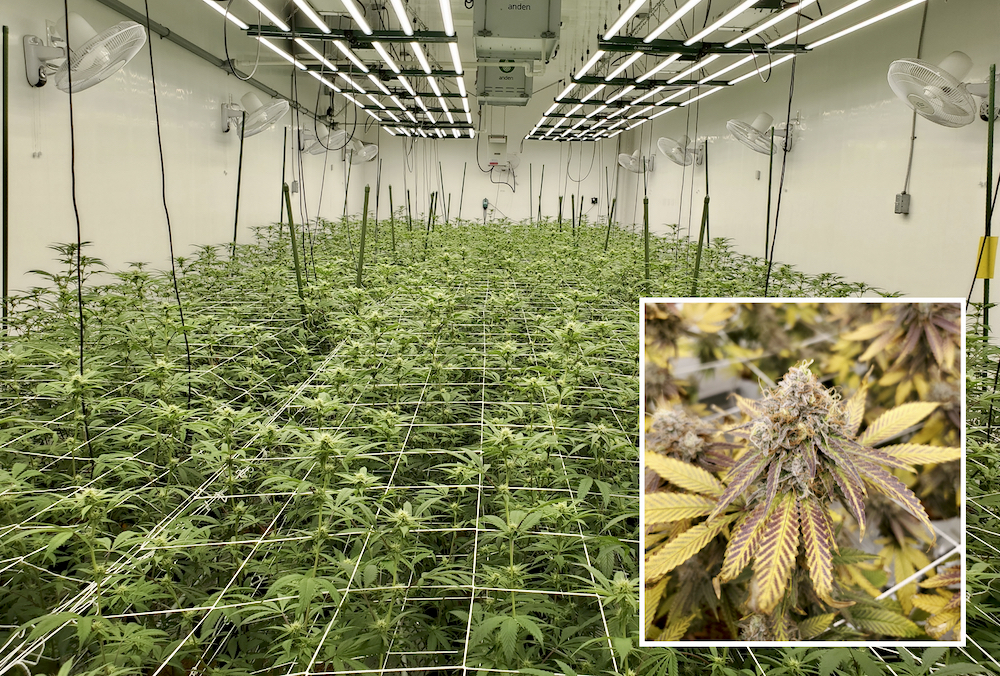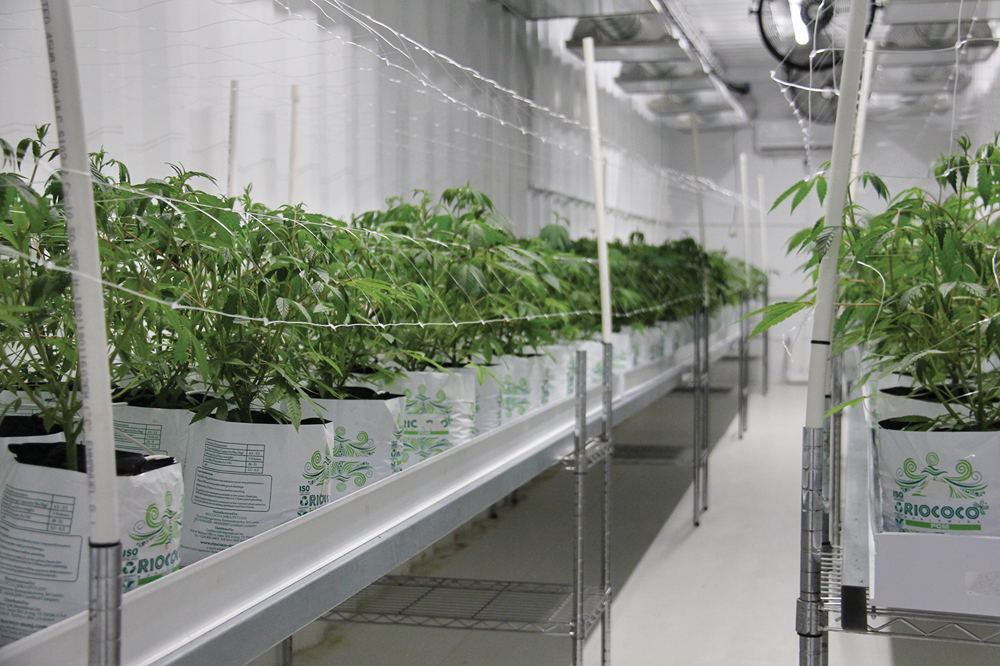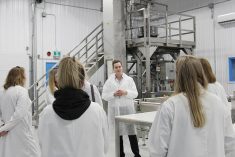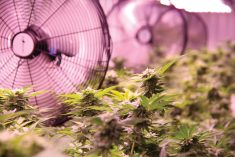Calcium-deficient cannabis plants get armpits.
“Armpits?” a Co-operator reporter asked.
Horticulturalist Rebecca Sokol held up her arm and showed what she calls the “chicken wing” women get.
He’s got that too, Adam Carritt protested.
“You’re never going to wear a shawl over a dress because you have that. I will,” Rebecca said.
The weed plants droop right there when they have a calcium deficit, she added. Within five minutes of first arriving at the Prairie Trichomes facility, she’d diagnosed what the Carritt family had been struggling with for months.
A few months later, Rebecca and her partner, master grower Jamie Snow, were moving into a house down the gravel road from the Carritt farmstead.
Prairie Trichomes, which Adam Carritt co-owns with his father Ken and brother Odell, is a cannabis micro-cultivator — meaning they’re licensed to grow no more than 200 square metres of plant surface area at any one time.
It consists of shipping container growing ‘pods’ tucked inside a big, red building that was once potato storage.

On and off the farm
The Carritt family has been farming near Carberry since before the turn of the 20th century, Adam told the Co-operator. They started with horses, wheat and other standard crops.
In the early 1980s, Adam’s parents, Ken and Brenda Carritt, thought it was a good time to start a potato farm. A potato-processing plant had opened a few years earlier in Carberry and contracts were being handed out, Adam said.
To their knowledge, Ken was one of the first potato farmers to bring pivot irrigation into Manitoba.
Ken also took a keen interest in potato nutrition and realized that hog barn waste would be a perfect soil amendment. They could use the miles of irrigation piping to carry hog manure into the potato fields.
Read Also
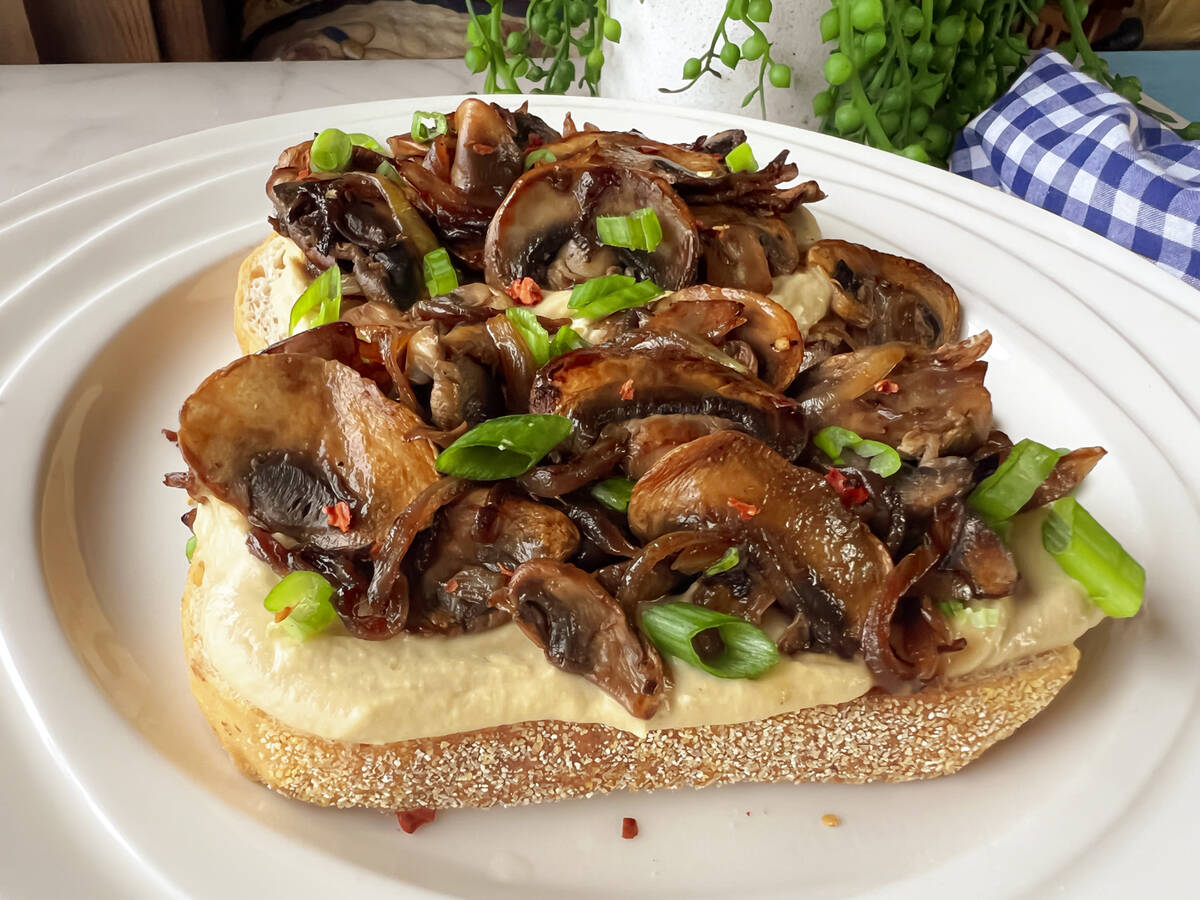
Use-it-up meals stretch the post-holiday menu
Leftovers and extra food abound in the first weeks of January. Give your kitchen a winter reset, clean out the fridge and save on your grocery bill
In the early 2000s, after mulling it over quite awhile, Ken built barns and expanded into hogs — today they finish hogs for Maple Leaf Foods, Adam said.
Unfortunately, that was about the time Ken realized he wanted to get out of potato farming.
“(He) just kind of got sick of it,” Adam said. “Every year it became more difficult to make a living.”
They stopped growing potatoes in 2005. For many years, the potato buildings sat empty as Adam found his own way off the farm to a home in Australia. A self-described “indoor boy,” he’d left the farm as soon as he graduated.
Nearly a decade later, legalization happened and Adam got a call from his dad.
“I’m thinking about growing cannabis on the farm. Would you like to come and help?” Adam recalls Ken saying. “So of course, I said yes.”
The dream job
Off the farm, Jamie had worked as a chef for many years but cooking had lost its shimmer.
As a kid he’d loved to help his mom in the garden, and after a high school experience with pot in the ’90s, he seeded his first cannabis plant — labelled as ‘sage’ or something.
“My mom busted me,” Jamie said.
Some eight or nine years ago, he tried growing again.
“I just wanted to live a different life,” Jamie said.
The constant chaos of the kitchen had taken its toll. Growing his first crop of cannabis had been somewhat of a revelation.
“I have somewhat of an addictive, obsessive personality,” Jamie explains. “When I really want to do something, I do it.”
He used books, internet forums, and his own extensive record-keeping to develop methods over the next years.
Rebecca had been on the cusp of studies in social work when a job with a medical cannabis grower changed her mind. After a long day of trimming the plants, she and the grower sat on his porch smoking a joint and looking over his pumpkin patch, sheep and cannabis plants.
The grower was doing what hadn’t seemed like an option to her, she realized, and he was happy.
“You can really be a farmer and you can grow weed and it’s legal,” Rebecca said. “I need to do this with my life.”
She changed her major to horticulture.
Years later, Rebecca met Ken Carritt when he came into the store where she sold fertilizer and other supplies to cannabis growers.
She recognized his name from “potato books,” Rebecca said.
Conversations led Ken to invite her to come check out his fledgling cannabis operation. They were producing decent-quality weed, Adam said, but with pitiful yields and sick plants.
Rebecca asked Jamie to tag along because, “I speak the nerd science, and he can put it into what other people understand.”
On the visit, they diagnosed the plants’ calcium deficiency “armpits.”
“After months of struggling, that was a godsend,” Adam said.
A few months later, Rebecca and Jamie agreed to work at Prairie Trichomes full time. They started in September 2021.

Rolling on
The Carritts applied for their first Prairie Trichomes retail store before they’d grown their first plant. As they waited for their micro-cultivation licence to be approved, the Manitoba government dropped its limit on stores in the province and put out a call for building applications.
Adam said he and Odell thought, “What have we got to lose?”
Odell developed the first store in Neepawa in late 2020. Since then, they’ve opened stores in Killarney, Gimli, Onanole and (briefly) in Brandon. Odell worked on mastering the provincial regulations around retail. Adam, for the most part, stayed at the farm and dealt with Health Canada’s rules for producing.
A year ago, Adam said, the hardest part was the growing. Rebecca and Jamie solved that.
Six months ago, the hardest part was the regulations. Building a system for recording and reporting all the data the feds required was a monster of a task for him and Rebecca.
“We cried a lot,” Rebecca said, laughing.
Over time, they realized that officials weren’t out to get them, Adam said. They’ll give time to fix mistakes.
In the early days, he said, he was paranoid he’d get arrested for forgetting to dot an ‘i’ or cross a ‘t.’
“I told you, it’ll be awesome,” Jamie joked, adding he’d planned to film the arrest and use it for “street cred.”
Today, the challenge is to keep it all together, Adam said.
“Staying present,” is Jamie’s challenge. He’s got a lot of ambition, and said he sometimes needs Rebecca to remind him how far they’ve come.
For Rebecca, it’s being at the whim of the plants. Despite the tightly controlled environment they grow in, the plants don’t conform to a calendar.
“As humans we want to schedule and time,” she said. “You have to allow the plant to be in control.”
“Adam and his dad understand that, and that is so much nicer,” Jamie said.
Despite long hours and paperwork, Rebecca said she and Jamie still go home and talk about cannabis. He could talk about it all day, Jamie adds.
Working with the plants — the “girls,” Jamie calls them — is a mood boost.
“It makes me happy to be with them.”






